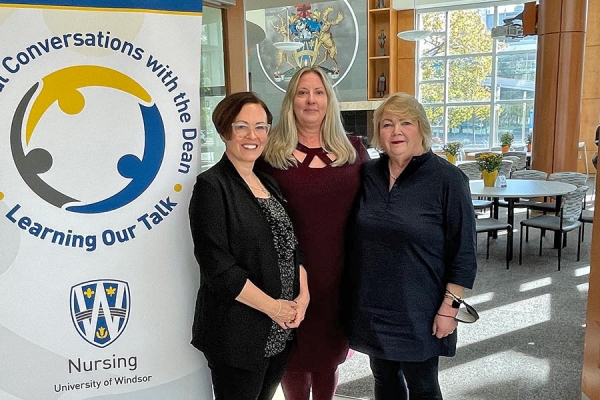 Chief Nursing Officer for Canada Leigh Chapman, chief nurse of the International Council of Nurses Michelle Acorn, and UWindsor dean of nursing Debbie Sheppard-LeMoine addressed an audience during “Dean’s Intentional Conversations” speaker series.
Chief Nursing Officer for Canada Leigh Chapman, chief nurse of the International Council of Nurses Michelle Acorn, and UWindsor dean of nursing Debbie Sheppard-LeMoine addressed an audience during “Dean’s Intentional Conversations” speaker series.
Chief Nursing Officer for Canada Leigh Chapman and chief nurse of the International Council of Nurses Michelle Acorn delivered keynote speeches for the “Dean’s Intentional Conversations” speaker series at the University of Windsor during a recent visit. The two-day tour included stops at local health-care organizations on both sides of the border.
Dr. Chapman assumed her role in 2022; she is responsible for stabilizing the nursing workforce and contributing to Canada’s health policy, offering strategic advice from a nursing perspective to Canada's health portfolio, convening on key nursing issues, and representing the federal government at public forums both within and outside of Canada.
Chapman’s address highlighted the need to harmonize the recruitment and integration of internationally educated nurses across Canada, streamline administrative processes to advance labour mobility for nurses working between provinces, improve nursing workforce planning data collection and processing, and engage nursing students, front-line workers, administrators, senior leadership, and other government officials to address nursing retention and enact change accordingly.
“We must take advantage of the opportunity before us by harnessing the skills inherent in our profession,” says Chapman. “We need to build a strong and supported nursing workforce that provides people in Canada with high quality, effective and safe health services when they need them.”
In May 2021, Dr. Acorn was appointed inaugural chief nurse with the International Council of Nurses, a non-governmental organization that is also a federation of over 130 national nurses association representing over 28 million nurses worldwide. The council is a non-state actor with the World Health Organization. In her role, Acorn provides strategic and operational executive leadership expertise to advance and strengthen nursing and health policy, that includes ensuring quality nursing care, and a respected, competent, and satisfied nursing workforce.
During her address, Acorn emphasized the significance of education in meeting or surpassing quality standards and aligning them with population health needs. She acknowledged the demand for nursing recruitment and retention programs to combat the global workforce shortage, while also advocating for safe and supportive service delivery environments for nurses. Acorn also encouraged women within the global health workforce to assume a more prominent role in leadership positions, which have historically been underrepresented for women in this field.
Acorn discussed universal health coverage and primary health care models in which all individuals would receive essential healthcare services without being exposed to financial hardship.
“We need to make sure we have affordable and accessible health services,” says Acorn. “We need to optimize our nursing professional workforces and ensure that nurses are being utilized as clinicians, and as both formal and informal leaders as well, to foster efficient and effective health systems.”
Subsequent visits to community health-care organizations, including Windsor Hospice, Windsor Essex Community Health Centre, Windsor-Essex County Health Unit, and Henry Ford Hospital, were marked by productive discussions on such topics as program models, unique needs, recruitment and retention, all culminating in informative facility tours.
View the executive summary of the Nursing Retention Toolkit: Improving the Working Lives of Nurses in Canada.
—Gam Macasaet
